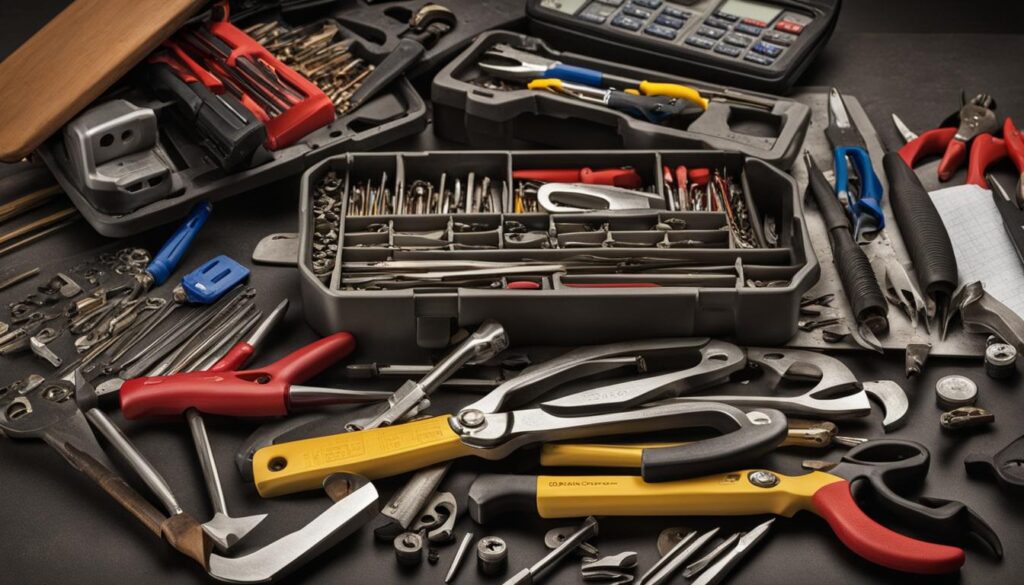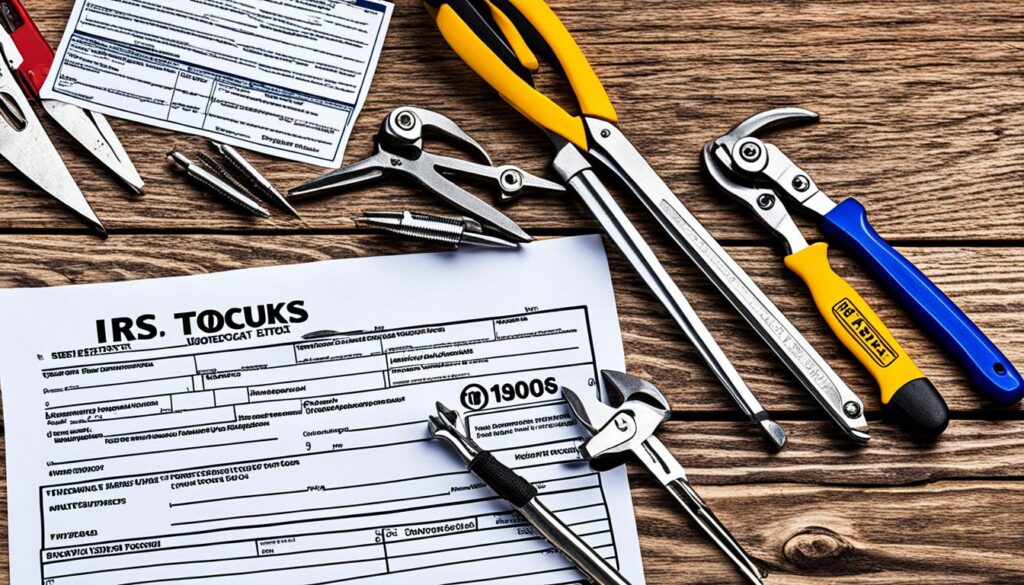Are work tools tax deductible? Tax deduction for work tools is a topic that often leaves people scratching their heads. You may have heard mixed opinions or conflicting information about whether you can claim tax deductions for the tools you use in your profession. But don’t fret! We’re here to help you navigate through the maze of tax rules and regulations to uncover the truth about tool deductions on your taxes.
Key Takeaways:
- Deductibility of work tools depends on certain criteria and can vary depending on your employment status.
- If you are self-employed, you may have more flexibility in deducting tools as business expenses.
- Tools with a useful life of less than one year can be fully deducted in the year of purchase.
- Tools with a useful life of more than one year must be depreciated over time or can be fully expensed under Section 179 if you are self-employed.
- Consulting with a tax professional can help you navigate the complexities of tool deductions and ensure you maximize your tax savings.
How Does Your Employment Status Affect Tax Deductions for Mechanics?
Being a mechanic comes with its own set of tax benefits, including the ability to claim deductions for work tools. However, the specific tax deductions you can claim as a mechanic may depend on your employment status.
If you work as an employee at a garage or business, you will typically receive a W-2 form at the end of the year that you can use to file your income taxes. As an employee, you may be eligible to deduct certain expenses related to your work tools under unreimbursed employee expenses. These expenses can include the cost of tools, repairs and maintenance, safety supplies, and even travel expenses if they are necessary for your job.
On the other hand, if you work as a self-employed mechanic, your tax obligations and deductions may be different. As a self-employed individual, you will report your business income on Schedule C of your Form 1040 tax return. This allows you to potentially deduct a wider range of expenses, including ordinary and necessary expenses related to your work tools.
Self-employed mechanics may be able to deduct expenses such as advertising costs, insurance premiums, repairs and maintenance, safety supplies, and even travel expenses. These deductions can help reduce your taxable income, ultimately lowering your overall tax liability.
In some cases, different business structures like partnerships or corporations may require separate tax returns. It’s essential to consult with a tax professional or accountant to ensure you are maximizing your eligible deductions based on your specific employment status and business structure.
| Deductible Expenses for Mechanics |
|---|
| Cost of tools |
| Repairs and maintenance |
| Safety supplies |
| Travel expenses related to work |
| Insurance premiums |
| Advertising costs |
By understanding how your employment status affects tax deductions and working with a tax professional, you can ensure you are claiming the appropriate deductions for your work tools as a mechanic. Maximizing your eligible deductions can lead to significant tax benefits and potential savings on your tax bill.
Maximizing Tax Deductions for Mechanics’ Tools

As a mechanic, you have the opportunity to maximize tax deductions for your tools, helping you save on your taxes. Understanding the rules and provisions that apply to deducting the cost of work tools can make a significant difference in your tax liability. Here are some strategies to help you make the most of your deductions:
- Deduct the full cost of tools: If your tools have a useful life of less than one year, you can deduct the entire cost in the year of purchase. This means that you can write off the expense right away, providing immediate tax savings.
- Depreciate tools with a longer lifespan: If your tools have a longer lifespan, typically more than one year, you’ll need to depreciate their cost over time. You can choose to use the recovery period rules or take advantage of the Section 179 expense deduction.
- Section 179 expense deduction: Under Section 179 of the IRS tax code, you have the option to expense the full cost of a tool in the year it is placed in service. However, there is a limitation to this deduction, as it cannot exceed your self-employment income.
- De minimis safe harbor election rules: The IRS has de minimis safe harbor election rules that allow eligible businesses, including mechanics, to deduct tools costing $2,500 or less. This provision offers a simplified approach to deducting lower-cost tools.
- Bonus depreciation and Section 179 provisions: Bonus depreciation and Section 179 provisions may also come into play when it comes to accelerating the depreciation of new tools and equipment. These provisions can provide additional tax benefits for mechanics.
To illustrate the potential tax deductions mechanics can enjoy, here’s a table highlighting the different deduction scenarios based on the lifespan of tools:
| Lifespan of Tools | Deduction Method |
|---|---|
| Less than one year | Full deduction in the year of purchase |
| More than one year | Depreciation over time or Section 179 expense deduction |
By understanding the rules and optimizing your deductions, you can significantly reduce your tax liability and keep more money in your pocket. Remember to consult with a tax professional to ensure you’re taking full advantage of all available deductions and to stay up to date on current IRS guidelines.
Tax Deductions for Auto Repair Shop Owners
As an auto repair shop owner, you have the opportunity to reduce your income tax bill through various tax deductions. By taking advantage of these deductions, you can minimize your tax liability and potentially save a significant amount of money. Here are some deductibles expenses you should consider:
- Start-up Costs: When starting your auto repair shop, you can deduct the expenses associated with setting up your business, such as legal fees, licensing costs, and advertising expenses.
- Office Expenses: Deductions can include rent for your office space, utilities, phone bills, internet expenses, and office supplies.
- Meeting and Entertainment Expenses: If you hold meetings or entertain clients to discuss business matters, you may be eligible to deduct the associated expenses, such as meals, entertainment, and travel.
- Interest on Credit: If you have taken loans or used credit to finance your auto repair shop, the interest paid on those loans may be tax deductible.
- Advertising Expenses: Costs related to promoting your auto repair shop, such as print advertisements, online marketing, and website development, can be deducted.
- Charitable Contributions: If you make charitable donations on behalf of your auto repair shop, those contributions may be tax deductible.
Additionally, there are specific deductions related to the tools and equipment used in your auto repair shop:
| Expense | Tax Deductibility |
|---|---|
| Vehicles or Equipment | Cost of purchase is tax deductible. |
| Software for Inventory Management | Cost of purchase is tax deductible. |
| Specialized Tools or Equipment | Cost of purchase is tax deductible. |
| Safety Equipment | Cost of purchase is tax deductible. |
| Uniform Costs | Cost of purchase and upkeep are tax deductible. |
Keep in mind that it’s essential to keep meticulous records of all your expenses to support your tax deductions. Proper documentation will ensure compliance with IRS regulations and help you maximize your tax return. Consider consulting with a tax professional who specializes in small businesses to ensure you are taking full advantage of all available deductions.
Understanding Tax Deductions for Auto Repair Shops
As an auto repair shop owner, understanding tax deductions is essential for maximizing your business’s financial benefits. By taking advantage of these deductions, you can lower your taxable income and ultimately reduce your tax payments. Let’s explore the various deductible expenses that apply to auto repair shops.
1. Start-up Costs
When setting up your auto repair shop, the initial investment can be quite substantial. Luckily, the IRS allows you to deduct certain start-up costs as business expenses. These costs may include equipment purchases, renovations, advertising, and legal fees.
2. Office Expenses
Running an efficient office is crucial for any auto repair shop. You can deduct office-related expenses such as rent, utilities, office supplies, and even the cost of computer software used for managing your business operations.
3. Meeting and Entertainment Expenses
As an auto repair shop owner, building strong relationships with your clients and suppliers is vital. You can deduct certain meeting and entertainment expenses related to client dinners, events, or business-related travel.
4. Interest on Credit
Many auto repair shops rely on loans or credit lines to finance their operations or purchase new equipment. The interest paid on these credit facilities is tax-deductible, allowing you to reduce your taxable income.
5. Advertising Expenses
Effective advertising is key to attracting new customers to your auto repair shop. You can deduct the costs associated with advertising your business, such as print ads, online marketing campaigns, and website development.
6. Charitable Contributions
Supporting charitable causes not only helps those in need but can also provide tax benefits for your business. Any donations made to qualified charitable organizations are tax-deductible, allowing you to give back to your community while lowering your tax liability.
7. Deductible Tools and Equipment
An auto repair shop relies heavily on tools, equipment, and specialized machinery. The good news is that these expenses can be tax-deductible. You can deduct the cost of purchasing or leasing vehicles, diagnostic equipment, lifting tools, and even safety equipment used in your business operations.
8. Proper Documentation is Key
To substantiate your tax deductions, it’s crucial to maintain accurate and detailed records of all your business expenses. Keep receipts, invoices, and any other supporting documents organized and easily accessible. This documentation will serve as proof of your deductible expenses in the event of an IRS audit or review.
Remember, consulting with a tax professional who specializes in small businesses or auto repair shops can provide valuable guidance tailored to your specific circumstances. They can help you navigate the complex tax laws and ensure you’re taking full advantage of all available deductions.
Qualifying Tools as Tax-Deductible Business Expenses

When it comes to tax deductions, it’s important to understand the criteria for qualifying work tools as deductible expenses. To be eligible for a tax deduction, tools used for business purposes must be considered ordinary and necessary for your trade or business. These tools should play an essential role in performing your job efficiently and effectively.
While self-employed professionals, such as independent contractors, freelancers, and small business owners, can take advantage of tax benefits for work tools, conventional employees typically do not have the opportunity to deduct tools as work-related expenses.
However, there is a potential solution for employees seeking reimbursement for job-related expenses without facing tax implications. Employees can approach their employers to request reimbursement for necessary work tools, saving themselves from potential tax burdens.
Tax-Deductible Tools for Self-Employed Professionals
As a self-employed professional, you have the opportunity to maximize your tax benefits by deducting work tools as business expenses. Here are some types of tools that are commonly eligible for tax deductions:
- Specialized mechanic tools
- Computer equipment
- Software licenses
- Diagnostic equipment
- Safety gear and protective clothing
Remember, it’s crucial to keep proper documentation and evidence of your purchase and usage of these tools in order to claim them as deductible expenses.
| Item | Deductible Expense |
|---|---|
| Specialized mechanic tools | ✓ |
| Computer equipment | ✓ |
| Software licenses | ✓ |
| Diagnostic equipment | ✓ |
| Safety gear and protective clothing | ✓ |
By taking advantage of tax deductions for work tools, self-employed professionals can substantially reduce their taxable income and overall tax liability. Make sure to consult with a tax professional who can guide you through the process and help you optimize your deductions.
Strategies for Optimizing Tax Deductions for Mechanics

When it comes to tax deductions for mechanics, implementing the right strategies can make a significant difference in your overall tax liability. By following these expert tips, you can optimize your deductions and potentially save a considerable amount of money on your taxes.
1. Maintain Meticulous Expense Records
Keeping detailed and organized records of your expenses is crucial for maximizing your tax deductions. Make sure to track all work-related expenses, including tools, equipment, training courses, and any other costs directly related to your trade. These records will serve as valuable evidence when claiming deductions and ensure you don’t miss out on any potential savings.
2. Categorize Expenses as “Ordinary and Necessary”
To qualify for tax deductions, your expenses must be deemed “ordinary and necessary” for your trade. When documenting your expenses, make sure to categorize them appropriately to ensure they meet the IRS’s criteria. By clearly demonstrating the necessity and relevance of your expenses to your profession, you can strengthen your case for tax deductions.
3. Consult with a Tax Professional
While navigating the complexities of tax deductions can be challenging, seeking expert guidance can help you identify additional opportunities for deductions and minimize the risk of errors. Consulting with a tax professional who specializes in mechanic deductions can provide valuable insights and ensure compliance with IRS rules and regulations.
4. Utilize Schedule C on Form 1040
If you’re self-employed as a mechanic, it’s important to report your income and expenses accurately using Schedule C on your Form 1040 tax return. Schedule C allows you to deduct eligible business expenses, including work tools, vehicle maintenance, insurance, and more. By utilizing this form correctly, you can ensure that all your deductible expenses are accounted for.
Wrapping Up Tool Deductions on Your Taxes
Taking advantage of tax deductions for work tools can lead to significant savings on your taxes. Whether you’re a mechanic or an auto repair shop owner, understanding the criteria for deductibility is key. By keeping proper records of your expenses, you can maximize your deductions and minimize your tax liability.
As a mechanic, you can deduct the cost of your work tools as a deductible expense. This includes small tools with a useful life of less than one year, which can be fully deducted in the year of purchase. For tools with a longer lifespan, such as expensive equipment, you can choose to depreciate the cost over time or fully expense it under Section 179 if you’re self-employed.
If you own an auto repair shop, you can also deduct the cost of vehicles, specialized tools, safety equipment, and uniforms. Additionally, expenses like start-up costs, office expenses, and advertising can be deducted as well. It’s crucial to keep meticulous records and consult with a tax professional to ensure you’re claiming all the deductible expenses you’re eligible for.
By staying updated on IRS rules and regulations, you can optimize your tax return and take full advantage of the tax benefits for work tools. Remember, it’s always wise to seek professional guidance to navigate the complex tax landscape and maximize your tax deductions.








